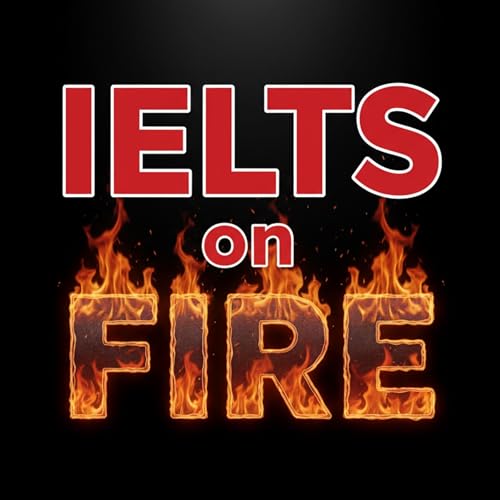
Don’t Say “Very” – Say This Instead – IELTS Speaking Sample
Failed to add items
Add to basket failed.
Add to Wish List failed.
Remove from Wish List failed.
Follow podcast failed
Unfollow podcast failed
-
Narrated by:
-
By:
About this listen
Hey everyone, welcome back to IELTS on Fire – your daily five-minute boost for real, useful IELTS tips. I’m Teacher Phil, and today we’re going to talk about a tiny word that weakens your English and how to replace it with words that sound much more natural and impressive.
If you want to boost your Speaking score fast, this one’s for you. Today’s focus: stop saying ‘very’ and start using strong, expressive alternatives that sound just like a native speaker."
Cue Card QuestionDescribe an experience when you felt very happy.
You should say:
- When and where it happened
- What made you feel so happy
- Who was with you
- And explain why you remember this experience so clearly
Okay, imagine you’re in the Speaking test. This topic pops up. Most students say ‘very happy’ or ‘very excited.’ But the examiner hears ‘very’ a hundred times a day. So, how can you stand out and sound more natural? Let’s listen to a sample answer using better words.
Sample Answer"One of the happiest moments in my life happened last year when I graduated from university. The ceremony was held on a sunny afternoon, and my whole family came to support me. Honestly, I was absolutely thrilled because I’d worked incredibly hard for four years, and this was the result.
My parents looked extremely proud, and I felt truly grateful to have them there. Afterwards, we went out for a delicious meal together, and I was completely satisfied with how the day turned out. The whole experience was incredibly memorable, not just because of the degree but because I got to share it with my loved ones. That’s why I remember it so clearly."
So, let me break it down. Did you notice I didn’t use ‘very’ even once? Instead, I used strong alternatives that make my English sound more natural and fluent. Here are five words and phrases you can use instead of ‘very’:
- Absolutely thrilled (instead of ‘very happy’)
- Incredibly hard (instead of ‘very hard’)
- Extremely proud (instead of ‘very proud’)
- Truly grateful (instead of ‘very grateful’)
- Completely satisfied (instead of ‘very satisfied’)
These are what we call collocations – words that naturally go together. Using them shows the examiner you have a good ear for real English.
And the best part? They’re super flexible. You can say, ‘absolutely delicious,’ ‘incredibly difficult,’ or ‘completely exhausted.’ Try using these in your next practice answer, and you’ll sound much more like a native speaker.
Quick Practice ChallengeAlright, time for your one-minute practice challenge. Think of three situations from your life when you felt a strong emotion – maybe excited, tired, proud, or surprised. Now, say three sentences out loud using one of today’s new words in each. For example, ‘I was absolutely exhausted after my exam,’ or ‘My parents were extremely proud when I got my first job.’
After the podcast, give it a try, and really focus on swapping out ‘very’ for one of these stronger words. Remember, your fluency isn’t born, it’s built. Let’s build it together.
Thanks for joining me today on IELTS on Fire. Keep practicing these natural phrases, and soon they’ll feel automatic. Tomorrow, we’ll dive into another quick tip for Speaking Part 2. Until then, let’s set your English on fire.


